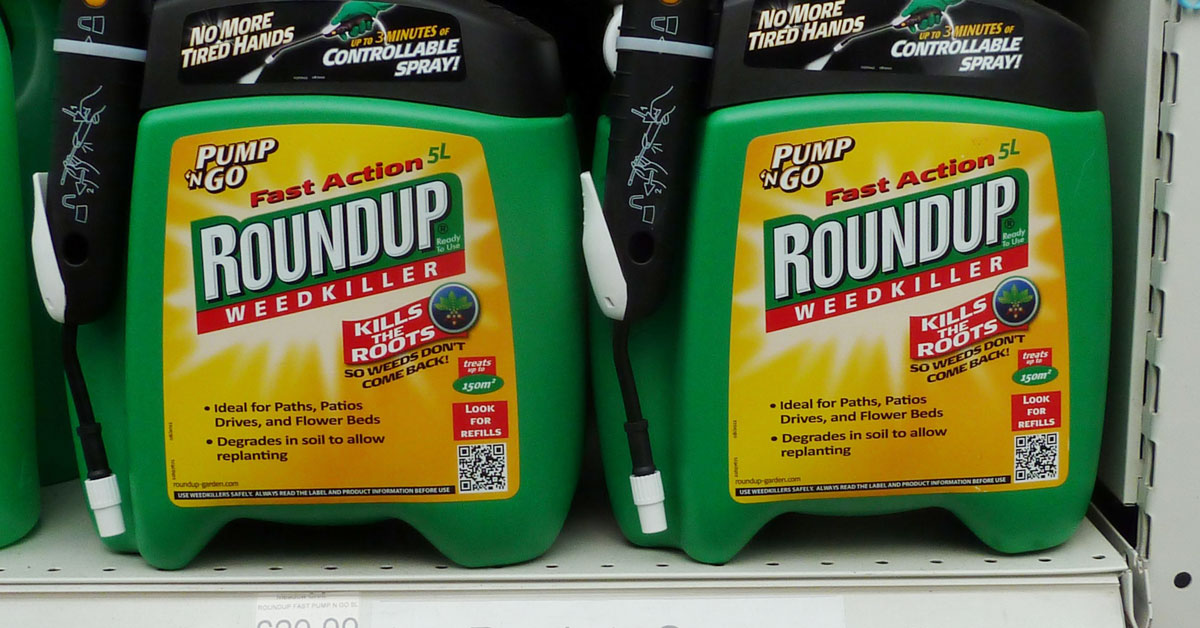Our latest Review covers a string of legal developments that constitute a major blow to Bayer, BASF, and Syngenta, most notably via the recent US court-imposed ban on the dicamba-based weedkillers used on GMO crops.
Bayer is also reeling from its other Monsanto-weedkiller litigation problem – the Roundup-cancer verdicts in the US that keep costing it billions, while big class action lawsuits move ahead in both Canada and Australia. And Syngenta is facing nationwide litigation in the US over its herbicide paraquat, which thousands of plaintiffs claim causes Parkinson’s. Meanwhile, Bayer is also being badly hurt by US lawsuits over PCB contamination, where it’s being sued by individuals, school districts, cities, and even whole states. See our LEGAL DEVELOPMENTS and MORE TOXICS sections for the details on all the above.
Equally problematic are the environmental and human health issues with glyphosate that keep being revealed – see LATEST RESEARCH. Research is also confirming the rapid decline in control over major weed species of the weedkiller that in combination with GMO crops was heralded as the “silver bullet” for weed control.
And yet late last year, the European Commission, after EU Member States failed to agree on its re-approval, decided to renew glyphosate’s authorisation for ten more years. See RENEWAL IN EUROPE for how that decision has already led to a raft of legal challenges.
But for the moment, the industry’s extraordinary level of influence over regulators and lawmakers keeps it moving forward, despite its terrible toxic record. Ironically, in his definitive history of Monsanto – Seed Money – the environmental historian Bart Elmore shows how the main driving force behind Monsanto becoming the leading pioneer in GMO crops and food was its need to escape its toxic past!
LEGAL DEVELOPMENTS
US: Federal dicamba ruling called “vital victory for farmers and the environment"
In what one plaintiff called “a sweeping victory for family farmers and dozens of endangered plants and animals”, a federal court in Arizona has rescinded the US Environmental Protection Agency’s 2020 approval of the highly volatile herbicide dicamba for use on certain genetically engineered crops. In a 47-page ruling, US District Judge David C. Bury found that the EPA failed to comply with public notice and comment requirements under the Federal Insecticide, Fungicide, and Rodenticide Act (FIFRA), legislation passed in 1947 to protect agricultural workers, consumers, and the environment. “This is a vital victory for farmers and the environment,” said George Kimbrell, legal director at the Center for Food Safety (CFS), a plaintiff in the case. “Time and time again, the evidence has shown that dicamba cannot be used without causing massive and unprecedented harm to farms as well as endangering plants and pollinators. The court today resoundingly reaffirmed what we have always maintained: The EPA’s and Monsanto’s claims of dicamba’s safety were irresponsible and unlawful,” Kimbrell added.
US: Farmworkers, environmental groups file legal action demanding Roundup ban
A legal action calls on the US Environmental Protection Agency (EPA) to immediately suspend and cancel the herbicide glyphosate, the main ingredient in Monsanto’s Roundup. Glyphosate’s registration is illegal, says the petition filed by Center for Food Safety on behalf of itself, Beyond Pesticides, and four farmworker advocacy groups. Last year, in a lawsuit brought by the same nonprofits, a federal court of appeals struck down EPA’s human health assessment because the agency wrongfully dismissed glyphosate’s cancer risk.
US: Bayer jury’s $2.2 billion Roundup verdict is biggest yet
Bayer’s Monsanto unit was ordered by a Pennsylvania jury to pay more than $2.2 billion to a former Roundup user who blamed his cancer on the weedkiller, in the largest verdict so far in five years of litigation over the herbicide. Jurors in state court in Philadelphia awarded John McKivison $250 million to compensate for his losses and $2 billion in punitive damages over his claims that years of using Roundup at work and at home caused his cancer. The 49-year-old was exposed to Roundup when he worked as a landscaper, according to evidence in the case. Monsanto has won 10 of 16 Roundup trials recently, but the cases it has lost include a $1.5 billion verdict in Missouri handed down in November to three ex-users of the herbicide. Bayer shares fell almost 3% before the jury announced its verdict after Bank of America analysts downgraded the company to underperform from neutral because of an overhang created by the Roundup litigation. Following the verdict, Reuters reported that Bayer shares fell nearly 6%, and that Bayer shares have lost 70% of their value since the company bought Monsanto in 2018.
Bayer’s billions in Roundup verdicts increase pressure for new legal strategy
Bayer faces mounting pressure to come up with a new plan for handling its Roundup weedkiller litigation after getting hammered by US jury verdicts totalling almost $4 billion over the last three months. The German conglomerate’s latest courtroom loss in Pennsylvania (see above) was its biggest since Roundup cases started going to trial five and a half years ago.
US appeals court finds Bayer not shielded from Roundup-cancer lawsuits
A three-judge panel of the Atlanta-based 11th US Circuit Court of Appeals rejected Bayer’s argument that federal regulators’ approval of Roundup shielded the company from being sued under state law for failing to warn consumers of the product’s risks. Several other appeals courts had previously reached the same conclusion in similar lawsuits.
US: Monsanto Roundup lawsuits: 40,000 (maybe 50,000) Roundup cases left… and counting!
Bayer is betting the company on appellate court rulings despite seven years of litigation in which they’ve either lost on appeal or just been ignored by the Supreme Court, writes lawyer Ronald V. Miller. Bayer’s “bet the company” strategy on a favourable appellate court ruling took a punch in the face in early February with an appellate court ruling (see item above) that a state failure-to-warn claim filed by a Roundup user, who alleges his cancer was caused by Monsanto’s weedkiller, is not barred by federal law regulating pesticide labels. In what Miller calls “one of the goofiest moves in recent appellate history”, Bayer settled with the plaintiff and then paid him to make this appeal in order to make favourable law – but then they lost the appeal. Miller writes: “If you’re a Bayer executive reading this, you have to consider the possibility your lawyers have steered you in the wrong direction... You must do what’s hard to save this company from ruins. This means finding the cash to get these cases settled once and for all and doing it quickly.”
US: A “cynical diversion” – Judge shuts down Monsanto’s bid to kick him off Roundup case
Tactics Monsanto used to challenge a $175 million Roundup verdict earned the company a sharp rebuke from the judge on the case. In a January 5 opinion, Judge James Crumlish III of the Philadelphia Court of Common Pleas slammed Monsanto for raising what he considered to be non-credible concerns about the court’s conduct during the trial. Crumlish’s ruling soundly rejected the defendant’s bid to kick the judge off the case. Crumlish called the defence’s efforts “a dilatory and cynical diversion aimed not at the merits of the evidence at the trial but at promoting a vindictive campaign against the jury and disqualifying the assigned trial judge from promptly artfully and fairly considering post-trial motions, impugning jurors… and challenging the integrity of the jury’s considered verdict entirely”.
Australia: Bayer faces Australian test with judge to decide whether Roundup caused cancer
An Australian court has heard closing arguments in the first phase of a big class action lawsuit against Bayer/Monsanto, the first such case in Australia to reach this stage. There is no jury. This judge-only trial will address whether Roundup causes cancer. If the judge rules that Roundup caused lymphoma, the court will then consider whether Bayer was negligent regarding the risks its products posed and should pay damages. More than 800 Australians, diagnosed with non-Hodgkin lymphoma, say their cancer is linked to their use of Roundup.
Canada: Ontario Superior Court of Justice certifies class action against Monsanto and Bayer regarding Roundup products
The Ontario Superior Court of Justice has certified a national class action lawsuit against Monsanto and Bayer centring on allegations that Roundup products cause non-Hodgkin’s Lymphoma (NHL). The class is represented by Jeffrey DeBlock, an NHL-survivor. Mr DeBlock was diagnosed with NHL when he was seventeen years old, after using Roundup as part of his summer job on a local farm.
Canada: What’s behind a newly certified weedkiller class action lawsuit
A recently certified class action lawsuit is seeking at least $1.2 billion from multinational company Bayer on behalf of Canadians who claim to have been harmed while using Roundup weedkiller products. The Canadian case comes as the controversial ingredient glyphosate was taken out of household Roundup products in the US this month. “We took this action exclusively to help manage litigation risk in the US and not because of any product safety concerns,” a Bayer email statement reads. “The vast majority of claims in the US have come from residential lawn and garden users, so this action largely eliminates the primary source of future claims.”
US: Bill that could limit lawsuits against pesticide manufacturers heads to Senate floor
A bill determining the future of pesticide-related lawsuits is headed to the Idaho Senate floor. Sen. Mark Harris, R-Soda Springs, said the bill would “protect agricultural pesticide products our farmers and ranchers depend on”. As written, the bill says that any pesticide approved by the US EPA and bearing the required warning label regarding potential threats to human health and safety would be considered to have given sufficient warning of the risks. The legislation is anticipated to provide immunity to pesticide manufacturers from most lawsuits about health conditions that arise from the use of pesticides. The bill comes to the Idaho Senate in the wake of several years of lawsuits in which plaintiffs across the country argued that exposure to the glyphosate-based herbicide, Roundup, caused them to develop cancer and other health conditions. Similar bills are being considered in Iowa, Florida, and Missouri. There’s more on what is happening in Iowa here. And see the Newsweek piece on the industry’s current attempt to use the US Congress to undercut court decisions and prevent state and local efforts to regulate toxic pesticides.
LATEST RESEARCH
American Academy of Pediatrics advises avoiding GMO foods where practical due to glyphosate residues
A new clinical report issued by the American Academy of Pediatrics (AAP) – the largest professional association of pediatricians in the United States – to provide guidance to clinicians in providing pediatric care addresses concerns raised by families about GM foods. It focuses on the risks of the herbicides sprayed on GM food and feed crops – especially glyphosate. The AAP report authors, three eminent pediatricians, note that glyphosate is a probable carcinogen and may be an endocrine (hormone) disruptor in humans. They also point out the link between high urinary levels of glyphosate in pregnant women with an increased risk of premature births. They add that other herbicides used on GM crops – dicamba and 2,4-D – are “possible” carcinogens, according to the International Agency for Research on Cancer (IARC). They give advice on how to avoid GMO foods in order to minimise glyphosate exposure – and it’s not as hard as some might think.
Pay close attention to what science says about glyphosate, warns pediatrician
Despite the American Academy of Pediatrics choosing their words carefully in discussing the potential dangers of glyphosate in our food supply, their new clinical report is being aggressively attacked by the usual pesticide-protecting voices, warns pediatrician Lee Evslin, former CEO of Wilcox Hospital. He notes that the AAP’s “expert panels include the most respected medical scientists in the nation. There’s growing international scientific concern about the health effects of chronic low-level glyphosate exposure. To call AAP unscientific for reviewing those concerns is unconscionable and incorrect.” And Dr Evslin details some of the increasing evidence of connections between cancer, endocrine dysfunction and glyphosate-based herbicides.
Mother’s glyphosate exposure during pregnancy increases risk of poor brain function and development
A new study published in Environmental Research finds an association between adverse neurodevelopment (brain function and development) among infants and exposure to the herbicide glyphosate during pregnancy (gestational). The increasing prevalence of neurodevelopmental disorders (NDDs) in the US has raised concerns about the impact of toxic exposures on child development.
Wheat intolerance might be due to glyphosate
A scientific review identifies glyphosate as a possible cause of the global rise in wheat intolerance. This condition is increasingly reported by people who don’t have a diagnosis of celiac disease (a condition where your immune system attacks your own tissues when you eat the protein gluten). The review authors, Jacqueline A. Barnett and Deanna L. Gibson from the University of British Columbia, note that wheat intolerance has grown in parallel with the spread of the Western diet, which includes high levels of refined carbohydrates. Yet clinical trials have shown that gluten from wheat is not responsible for causing symptoms in healthy individuals, suggesting that something else is inducing symptoms. Based on existing solid research, the authors hypothesise that the “something else” might be glyphosate. While no GM glyphosate-tolerant wheat is commercially planted in North America, glyphosate-based herbicides are often sprayed on non-GM wheat pre-harvest to desiccate it (“dry it down”).
Global Glyphosate Study researchers make leukemia data publicly available
The Global Glyphosate Study (GGS) researchers who found increased incidence of leukemia in rats exposed to low doses of glyphosate and glyphosate-based herbicides have made these data publicly available on the pre-print site bioRxiv. The findings, which derive from the study’s carcinogenicity arm, showed that both glyphosate and glyphosate-based herbicides caused leukemia in rats at a young age and at low doses of exposure. No leukemias were observed in unexposed rats.
Pregnant women near farms had higher glyphosate levels during spraying season
Pregnant women living near farm fields show “significantly” increased concentrations of glyphosate weedkiller in their urine during periods when farmers are spraying their fields with the herbicide, according to a scientific paper. The research team said the findings were concerning, given recent studies that found gestational exposure to glyphosate is associated with reduced fetal growth and other fetal problems. Glyphosate separately has been linked to cancer and other health problems. “If the developing fetus is especially vulnerable to glyphosate, it is critical to understand the magnitude and sources of exposure during this critical developmental period,” the paper states. The results of the study were surprising because none of the women studied worked with glyphosate or other herbicides or had a household member who worked with weedkillers, said Cynthia Curl, associate professor at Boise State and lead author on the paper. Two authors of the study have written an article about their findings in The Conversation.
Marker of DNA damage seen in men applying Roundup and other glyphosate-based herbicides
A new paper from the US National Institutes of Health reports indications of DNA damage among men applying Roundup and other glyphosate-based herbicides. DNA damage is concerning because it can lead to cancer. A commentary on the paper published in the same issue of the journal calls it “a critical step forward in filling knowledge gaps of glyphosate carcinogenicity in humans”. The study’s authors were inspired to conduct their study because although mechanistic studies in human cells and animals support the genotoxic effects of glyphosate, “evidence in human populations is scarce”. They analysed the blood, urine and mouth cells of licensed pesticide applicators in Iowa and North Carolina. They found links between lifetime occupational use and a marker of DNA damage known as mosaic loss of chromosome Y (mLOY). mLOY is a chromosomal alteration that is commonly detected in the blood cells of adult men, especially ageing men. It has been associated with blood cancers such as lymphoma, myeloma, and leukemia, as well as with Alzheimer’s disease.
Roundup exposure damages the brain – study
An open-access study in rats shows that the melatonin hormone system is damaged by the glyphosate-based herbicide Roundup. Melatonin has neuroprotective effects, especially against oxidative stress, and decreased melatonin levels are suggested to be involved in the development of various neurological disorders, including Parkinson’s disease and Alzheimer’s disease. Serum melatonin levels decreased and oxidative stress significantly increased in the brains of adult rats perinatally (before and after birth) exposed to Roundup. The authors conclude, “The results show that early-life GBH [glyphosate-based herbicide] exposure can cause persistent neuroendocrine deficits that may promote long-term oxidative brain damage.”
The silver bullet that wasn’t: Glyphosate’s declining weed control over 25 years
Crop-killing weeds such as kochia are advancing across the US northern plains and Midwest, in the latest sign that weeds are developing resistance to chemicals faster than companies such as Bayer and Corteva can develop new ones to fight them. In many cases weeds are developing resistance against multiple herbicides, scientists said. Reuters interviewed two dozen farmers, scientists, weed specialists, and company executives and reviewed eight academic papers published since 2021 which described how kochia, waterhemp, giant ragweed and other weeds are squeezing out crops in North Dakota, Iowa, Wisconsin and Minnesota as chemicals lose their effectiveness. A global database shows reduced effectiveness of glyphosate against 361 different weed species, including 180 in the US. Some 21 weed species globally show resistance to dicamba.
RENEWAL IN EUROPE
European Commission approves glyphosate for another 10 years
After EU Member States failed to reach the required qualified majority to renew or reject the approval of glyphosate in a second round of voting on 16 November, the European Commission decided to renew the authorisation, approving its use in EU Member States for ten more years. Following the decision, the Commission released a statement saying that, on the basis of opinions published by the European Food Safety Authority (EFSA) and the European Chemicals Agency (ECHA), it will renew the licence, “subject to certain new conditions and restrictions”. The conditions include a ban on the use of the chemical to dry (desiccate) crops before harvest and “the need for certain measures to protect non-target organisms”. Germany’s Agriculture Minister criticised the renewal of glyphosate, saying, “I very much regret this”. And France’s Environment Minister called it “stupidity” and said France was opposed to this “environmental step backwards”.
Raft of legal challenges launched against EU glyphosate approval
Environmental groups, EU lawmakers, and citizen activists are launching separate legal challenges against the European Commission’s controversial decision last year to renew its authorisation for the weedkiller glyphosate for another decade. The actions, which include requests for an internal review by the Commission and potential appeals to the Court of Justice of the EU, seek to overturn the reauthorisation and raise concerns about the herbicide’s potential health and environmental risks. The environmental group Pesticide Action Network Europe (PAN Europe), leading a coalition of five other NGOs, filed a request for an internal review, arguing that the Commission’s safety assessment was “not objective, transparent or scientifically sound”. In a similar vein, the French NGO Secrets Toxiques and Green lawmakers in the European Parliament have launched a legal challenge alleging that the safety assessment failed to properly consider glyphosate’s long-term effects on human health, due to missing data. The German environmental NGO Aurelia Foundation has also launched a legal action, focusing specifically on the potential risks of glyphosate to biodiversity, including on bee populations and soil health. See also this piece by PAN Europe.
NGOs challenge glyphosate re-approval in EU court
Pesticide Action Network (PAN) Europe and four member organisations are challenging the re-approval of glyphosate in court. These organisations are experts in pesticide evaluation and regulation and have significant experience in EU and national Courts. Dr Martin Dermine, executive director of PAN Europe, states: “The re-approval directly contradicts the findings of numerous independent scientists who have researched the impacts of glyphosate. It defies the will of the vast majority of Europeans and ignores the urgent need and political commitment to reduce pesticide use. Most importantly, it contravenes EU pesticide laws, which prioritise health and biodiversity protection over economic interests. Our opposition is grounded in compelling legal and scientific evidence.”
French insurance companies slam EU re-authorisation of glyphosate as repeat of asbestos scandal
In the light of the re-authorisation of glyphosate in the EU, the leaders of forty French mutual insurance companies have spoken out in Le Monde about the danger of repeating with pesticides the same costly mistakes that were made with asbestos. The insurers say something the asbestos and pesticide tragedies have in common is the lack of transparency from manufacturers who know that their products kill. They cite Monsanto blocking publication of a research report showing the genotoxicity of glyphosate-based herbicides. They write, “How can we explain that toxic pesticides are still used when occupational diseases (prostate and blood cancers, Parkinson’s disease) linked to pesticides are recognised and compensated by Social Security? This lack of consistency in public health was also the case with asbestos.”
Victim of glyphosate receives whistleblower award
On 13 December Théo Grataloup (a victim of glyphosate who spoke against its EU renewal) received the Vakita Whistleblower Award 2023. His mother Sabine tweeted that the award is “A recognition of his fight for life first, then against glyphosate – so that others no longer have to go through the same suffering.” Théo’s case led to the link between glyphosate and birth defects being officially recognised in France. His family are suing Monsanto over the impact on him of its flagship product. Their six-year legal battle is now drawing to a close and the French news site Reporterre has a moving portrait of Sabine Grataloup and her 16 years of struggle for Théo against the agrochemical giant (in French).
Brighton, UK: Scientists slam council’s plans to reintroduce glyphosate
Glyphosate was banned by Brighton and Hove council in 2019 due to concerns it could cause cancer and damage the environment. The ruling Labour Party told voters in its 2023 election manifesto that it “won’t return to the use of harmful glyphosate” but some seven months later it is backtracking on its manifesto commitment. The news of the u-turn was met by furious protest and a petition. Professor Dave Goulson, the well-known bee expert at the University of Sussex, which has its campus in Brighton, said reintroducing glyphosate would be a real step backwards: “It could be carcinogenic, and many independent scientists have come to that conclusion. That’s enough for me to say that we shouldn’t spray it on our streets and parks. I strongly believe that in the long run it will be banned. There’s a lot of evidence that it’s harmful to other organisms and that it damages the soil.” And while the council claimed they could not manage without some use of glyphosate, Professor Goulson pointed out that, “The whole of Paris is managed without glyphosate.” Indeed, the use of glyphosate in cities is illegal throughout France.
MORE TOXICS
Monsanto loses bid to end city of Seattle lawsuit over PCB contamination
A federal judge has rebuffed Monsanto’s attempt to end a lawsuit brought by Seattle that seeks over 700 million dollars in damages to mitigate the contamination of the Duwamish River and the city’s stormwater and drainage system by Monsanto's PCBs. Seattle says Monsanto knew for decades of the potential dangers of PCBs but concealed this.
Monsanto ordered to pay $857 million to Washington school students and parent volunteers over toxic PCBs
In December, Bayer’s Monsanto was ordered to pay $857 million to a group of seven former students and parent volunteers at a Washington state school who claimed the company’s PCBs sickened them. It already faced paying $870 million in damages from lawsuits involving PCB exposure at the same school. And it’s facing more lawsuits over PCBs, including one from the state of Vermont which alleges the chemical company knew its PCB formulations were toxic and could cause harm in humans. Vermont’s Burlington School District has also sued Monsanto over PCBs. About 55,000 schools were constructed during the peak decades of PCB production, of which Monsanto was the sole commercial manufacturer.
Toxic chemicals in UK whales and dolphins are exceeding safe limits – Monsanto is a suspected culprit
A new study shows toxic chemicals in UK whales and dolphins are exceeding safe limits. Almost half of marine mammals around the UK are being poisoned. The most abundant pollutants found were PCBs — chemicals that were discharged from the former Monsanto site in Newport on the Severn estuary.
Monsanto legacy in Wales? Heavy rains see “contaminated” water pouring from Ty Llwyd Quarry
Heavy rains overwhelmed defences put in place at the Ty Llwyd Quarry by Caerphilly Council to prevent chemical waste allegedly abandoned by Monsanto contaminating surrounding woodland, roads, reaching the village of Ynsddu and the River Sihowy. Monsanto (which has since been bought up by Bayer) is thought to have used the site to store chemical waste from its Newport factory. When it left the site, it abandoned barrels of chemical waste. The barrels are now expiring and leaking. Members of the Welsh Parliament (the Senedd) have called for government action to tackle Monsanto’s toxic dumping, which involved carcinogenic PCBs, among other substances.
The Pesticide Playbook: New documentary shows corporate capture of regulators
An excellent new documentary from Al Jazeera is available online showing how Syngenta covered up paraquat’s links to Parkinson’s. It also shows how corporate influence over US regulators and the suppression of scientific research has kept paraquat, one of the most toxic herbicides in the world, on the market in the US, despite its being banned in Switzerland since 1989 and in the European Union since 2007. The documentary includes an interview with Margaret McCormack, a retired EPA scientist, who says, “Pesticide companies and their congressmen have tremendous influence on EPA’s decisions.” She also says, “Just about every new pesticide application that’s submitted to the agency is approved, no matter how high the risk,” and that it “can be detrimental for someone’s career” to speak up about data showing a pesticide is unsafe. Some of her other revealing comments that didn’t make it into the documentary are included in this article (linked above) by Carey Gillam.
Exposure to widely used insecticides decreases sperm concentration, study finds
Exposure to several widely used insecticides probably decreases sperm concentration and may have profound effects on male fertility, new US research finds. The researchers analysed five decades of peer-reviewed studies to determine if organophosphates and carbamate-based pesticides exposure correlated with decreased sperm concentration. Collectively, the studies researchers included looked at about 1,800 men, and showed what co-author Melissa Perry characterised as a “strong association”. “Based on this meta analysis, we believe insecticide exposure… is impacting overall sperm concentration,” she said. “The message is we need to reduce insecticide exposure in order to ensure men who are planning a family or want to conceive children are able to do that without interference.”
Residents exposed to pesticides in the air: Even 70 meters buffer zone is not enough!
Environmental group Générations Futures has published a report based on air analyses showing that in agricultural areas, distances of several tens of meters do not protect against aerial exposure to pesticides. The association calls for non-treatment zones (ZNT) for chemical pesticides of at least 150 meters.
Commonly used pesticides significantly harm bumblebees in real farm conditions – study
Pesticides commonly used on farmland significantly harm bumblebees, according to a study spanning 106 sites across eight European countries. While the agricultural use of insecticides has been in the spotlight for negative effects on bees, there are gaps in scientists’ knowledge about how the effects scale beyond single substances in fields. In the study, researchers answered calls for a more realistic assessment of the risks posed by mixtures of commonly used pesticides at landscape scales. The findings, published in Nature, show that despite regulation, the use of approved pesticides in European agricultural landscapes still negatively affects non-target organisms – significantly reducing the colony performance of bumblebees, a key wild and commercial pollinator. The scientists concluded that “the regulatory system fails to sufficiently prevent pesticide-related impacts on non-target organisms”.
..................................................................
We hope you’ve enjoyed this newsletter, which is made possible by readers’ donations. Please support our work with a one-off or regular donation. Thank you!





